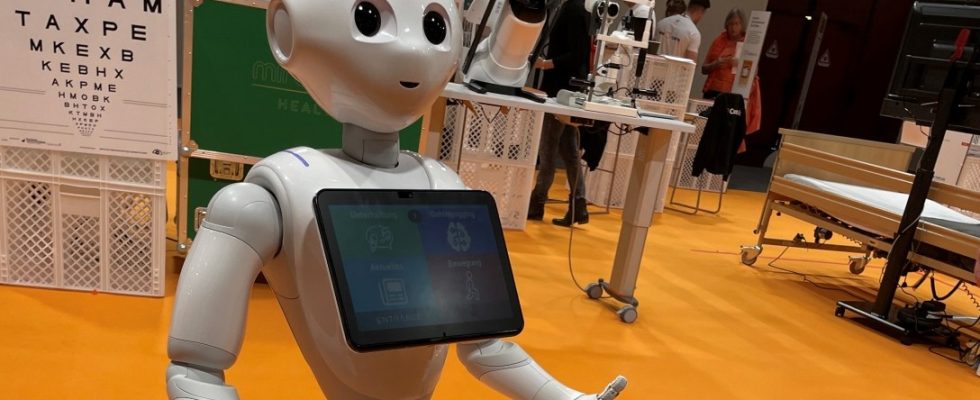Secretly sneaking out of bed at night and plundering the chocolate supplies in the kitchen – that’s no longer possible in the care household of the future. The bed itself would rat on you. Apparently harmless and comfortably upholstered with purple pillows, the new monitoring instrument is at the Nuremberg Nursing Care Fair in the exhibition room of Wissner-Bosserhoff, Europe’s largest nursing bed manufacturer, as a diligent trade fair representative reports. The bed, he explains, not only measures whether someone is lying in it, but also how much the person weighs and how often they turn over. And it can feed the data directly into the nursing documentation.
Welcome to the Nuremberg Care Fair 2023. For three days, around 560 exhibitors will be presenting their latest products. From Bavaria, large companies such as the Nuremberg software company Datev with its 8,500 employees and 1.2 billion euros in sales are represented, as is the 220-strong family business Hans Müller Medizintechnik. But there is also the Furnawo carpentry business near Bayreuth, which builds cooking islands on wheels that can be pushed right into the residents’ rooms. Or the Munich start-up company Enna. One of the founders invented a simple way to access the Internet that his grandmother can also use.
But nothing shows the new trends in care as clearly as the bed: it used to be considered innovative if a care bed could be lowered down to the floor. If a person slipped off the mattress, he didn’t hurt himself. Today, on the other hand, the bed itself can sound the alarm if the resident falls out, but also if they lose weight or have restless sleep. Complete digital surveillance is the order of the day.
Nobody is sleeping here at the moment: “Out” is written in the yellow display on the monitor behind this bed.
(Photo: Nina von Hardenberg)
At the fair, the companies certainly emphasize the advantages that this holds for homes and for the elderly themselves. The bed relieves the nursing staff of the annoying documentation. And with surveillance, an old person may dare to live alone longer. This is also the argument made by representatives of Gigaset. The former Siemens subsidiary, known for its landline telephones, is presenting a type of room surveillance system in Nuremberg. Sensors measure movements and can thus warn relatives if grandmother goes for a walk at unusual times.
Such control may not suit everyone. However, there is an urgent need for concepts on how old people can live alone at home for as long as possible. The baby boomer generation is reaching retirement age and the number of old people in Germany is growing with them, as the federal government’s care officer Claudia Moll, who swoops in from Berlin to make a brief appearance at the opening ceremony, points out. At the end of 2021, around five million people in Germany were in need of care, according to calculations by the Federal Statistical Office, by 2055 there could be around 6.8 million. Even now, however, there are not enough nurses to care for the elderly. She has nothing against intelligent technology, such as the entertainment robot Pepper, says Moll, but the nursing staff can never replace it.
Pepper is a robot from the Aldebaran company that is already entertaining the elderly in 70 nursing homes. In Nuremberg, too, he quickly finds his audience when he offers to estimate the age of the passers-by. “You’re 27 years old and a girl,” he explains to an astonished young man in a cap. With “Servus” and “Hello” the cleaning robots from the Kenter company on the other side of the room also beg for attention. They, too, are already wiping through the corridors of the Nuremberg North Clinic. But they too only clean and don’t care, as the representative emphasizes.
The real care, it will remain the task of the people in the future, that’s how it works in Nuremberg. It is therefore better to stop talking badly about this profession, warns the nursing officer Moll. She then has to return to Berlin quickly, although she could certainly have found such positive stories at the fair. From one stand, for example, the chirping of birds is so loud that visitors have to look inside involuntarily. Inside, a video shows lush green trees, a bell-like female voice sings folk songs. The voice comes from Friederike Bähr, a nurse and social worker who specializes in dementia patients and who started shooting forest videos during Corona. First she tested the videos in a home in Marktheidenfeld, Lower Franconia. Now she is at the fair for the first time to sell her to other homes. The residents like her films, she says. But they are just as important for the nursing staff, who come into contact with the people they care for again through the films and songs.

